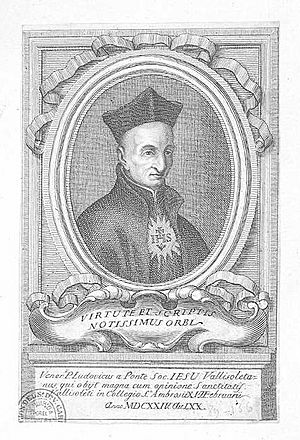Luis de la Puente facts for kids
Luis de la Puente (born November 11, 1554 – died February 16, 1624) was an important Spanish Jesuit priest and writer. He was known for his deep studies of religion (a theologian) and for writing about how people could live a more spiritual life (an ascetic writer). After he died, the Catholic Church began the process to consider him for sainthood.
Life of Luis de la Puente
Luis de la Puente was born in Valladolid, a city in Spain. When he was older, he joined the Society of Jesus, which is also known as the Jesuit order. This is a group of Catholic priests and brothers.
He studied philosophy at the famous University of Salamanca. Sadly, he had poor health, which meant he couldn't continue his teaching duties. Because of this, he focused on writing instead.
In 1580, he became a Catholic priest. He also became a spiritual guide for a woman named Marina de Escobar. He continued to guide her until he died. In 1599, he bravely helped people who were sick with the plague in a town called Villagarcía de Campos. He passed away in his hometown of Valladolid.
His Writings and Ideas
Luis de la Puente's writings are full of practical advice for living a spiritual life. Even though his books are not considered classic Spanish literature, they are very important for understanding how to grow in faith.
He was known for combining different ideas about spiritual guidance. He brought together thoughts from important thinkers like Augustine and Thomas Aquinas, along with ideas about deep mystical experiences.
Main Works of Luis de la Puente
Luis de la Puente wrote many books, mostly in Spanish. Here are some of his most well-known works:
- "Life of Father Baltasar Alvarez" (Vida del P. Baltasar Alvarez): This book tells the story of another Jesuit priest.
- "Life of Marina de Escobar": This book shares the life story of the woman he guided spiritually.
- "Spiritual Directory for Confession, Communion and the Sacrifice of the Mass": This book gave guidance on important Catholic practices.
- "The Christian Life" (4 volumes): A large work about how to live as a Christian.
- "Meditations on the Mysteries of Our Holy Faith": This is his most famous work, offering reflections on different parts of the Catholic faith.
- "On the perfection of various states of life": This series of books explored how to live a perfect Christian life in different situations.
- Volume One
- Volume Two: Of the Sacraments of Baptism and Confirmation and the Perfection practiced in them
- Volume Three: On Virginity and religion and following the Counsels
- Volume Three: On the States, Offices, and Ministries of Church Hierarchy
See also
- In Spanish: Luis de la Puente para niños
 | William L. Dawson |
 | W. E. B. Du Bois |
 | Harry Belafonte |


